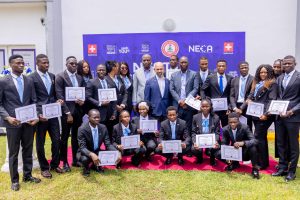By Barnabas Esiet.
Youth Unemployment in Nigeria
Nigeria, Africa’s largest economy, faces a daunting challenge: youth unemployment. With a significant portion of its population under 30 years old, the country’s youthful demographic presents both an opportunity and a threat.
Economic experts say a country’s inability to provide meaningful employment for its young people has far-reaching consequences, affecting not only individuals but also national stability and economic growth.
National Bureau of Statistics (NBS) report indicates that Nigeria’s unemployment rate is particularly concerning with youth unemployment reaching an alarming all time high of 53.40 percent in the last quarter of 2020.
This demographic accounts for the majority of the unemployed, highlighting the urgent need for effective solutions.
Several factors contribute to Nigeria’s youth unemployment crisis, including inadequate education and skills, insufficient infrastructure, limited job opportunities, corruption, and poor economic policies. Additionally, the labor market’s inefficiencies exacerbate the issue.
Government Initiatives
To address youth unemployment, the Nigerian government has launched various programs aimed at promoting youth empowerment, education, and employment.
The National Youth Policy serves as a framework for these initiatives, which include training and job opportunities for hundreds of thousands of youth.
Other programs focus on entrepreneurship development, vocational training, and agriculture. Despite these efforts, there are still enormous challenges and limitations.
Funding constraints, inadequate infrastructure, corruption, and limited reach and accessibility hinder the effectiveness of these initiatives. Moreover, coordination among government agencies remains a challenge.
Youth unemployment in Nigeria demands urgent attention. Government initiatives, though well-intentioned, face challenges. A multi-stakeholder approach, addressing root causes and leveraging private sector and civil society expertise, is essential.
Private Sector Initiatives
Since government cannot do it all alone, the private sector and civil society organizations also play crucial roles in addressing youth unemployment.
Nestlé Nigeria has been at the forefront of youth empowerment and development in the country, investing heavily in various initiatives that equip young people with the skills and knowledge needed to succeed in their chosen careers.
Nestle’s efforts in this area has received overwhelming commendations from various quarters including government, institutions and progressive Nigerians.
This comprehensive approach has made a significant impact on the lives of numerous young Nigerians, enhancing their employability and empowering them to achieve financial independence.
Youth Empowerment Programs
One of the company’s flagship programs is the “Building Future Entrepreneurs” initiative, which aims to promote youth employment through entrepreneurship.
This program provides young people with the necessary training and resources to start and run their own businesses.
Through workshops, mentorship, and funding, participants gain valuable insights into the world of entrepreneurship.
Another program is the “My Own Business” (MYOWBU) initiative, which works with young people to develop their entrepreneurial skills.
This program has been highly successful, with many participants going on to establish thriving businesses.
The initiative focuses on building capacity, enhancing creativity, and fostering innovation.
One of the beneficiaries of MYOWBU is Wasiu Adeyeye, a school leaver who, like many Nigerian youths could not find gainful employment, started as a pushcart operator and grew his business to a more upscale Mobile Café. He is grateful to have been part of the MYOWBU program.
In his words, “When my friend and former schoolmate introduced me to the Nescafé pushcart initiative, I did not believe that this business would help me become successful in life.
” I soon realised that with hard work and persistence, I would succeed, so I patiently understudied my friend and worked diligently. Today, I am happy to say that, I have been able to cater for my wife and my child.
” I am able to pay my daughter’s her school fees. In fact, we are doing well. I am confident that my future is promising.”
Technical Skills Development and Financial Investment
Nestlé Nigeria has also invested significantly in technical skills development, with a focus on bridging the technical skills gap in the industry.
The company has established various training programs that provide young people with the technical skills needed to succeed in their chosen careers.
The Nestlé Nigeria Technical Training Program is a prime example. This rigorous 18-month program provides training in technical skills such as electrical engineering, mechanical engineering, and instrumentation.
Over 200 young Nigerians have completed the program since its inception, acquiring hands-on experience and industry-recognized certifications.
The company’s Technical Training Centre (TTC) in Agbara recently graduated more young trainees, bringing the total number of graduates to over 190 since the program’s inception.
Wassim Elhusseini, Managing Director/CEO of Nestlé Nigeria, said the company has invested over N6 billion in upskilling young Nigerians since 2011, which shows Nestlé’s commitment to grooming the next generation of skilled professionals.
“By bridging the technical skills gap in the industry, we are not only enhancing the employability of our youth but also empowering them to achieve financial independence, enabling them to contribute meaningfully to their communities and society at large. This is one of the ways we are creating shared value,” he said.
“This initiative aims to help young people access economic opportunities, focusing on four pillars: getting them hired, skilled, supported, and providing them with more opportunities.
” Through various programs under this banner, Nestlé reaches an average of 25,000 youths annually,” Elhusseini added.
This rigorous training significantly enhances the employability of participants, with 97% of graduates employed within Nestlé Nigeria.
The company’s efforts have also been recognised by the Ogun State Commissioner for Education, Science and Technology, Professor Abayomi Adelaja Arigbabu, who commended the graduates’ hard work and dedication.
“To the graduands, I offer my heartfelt congratulations to you. Your hard work, dedication, and perseverance have paid off, and you should be proud of your achievements.
“The skills and training you have acquired in the Nestlé Technical Training Centre is a powerful tool that can shape your future and open doors to new possibilities. I implore you to strive for excellence in all your endeavors and make a positive impact in your chosen field.” Professor Arigbabu said.

Nestlé Nigeria’s investment of over N6 billion in its youth empowerment and development initiatives, demonstrates the company’s commitment to empowering young people and helping them achieve their full potential.
Impact
The impact of Nestlé Nigeria’s youth empowerment and development initiatives has been profound. Many young people have benefited from these programs, gaining the skills and knowledge needed to succeed in their chosen careers.
The programs have also helped bridge the technical skills gap in the industry, enhancing employability and empowering young people to achieve financial independence.
Participants have gone on to start their own businesses, create jobs, and contribute to Nigeria’s economic growth.
Success Stories
Several success stories have emerged from Nestlé Nigeria’s youth empowerment programs. For instance, 25year-old Emmanuel, a beneficiary of the MYOWBU initiative, established a thriving food processing business, creating employment opportunities for others.
Similarly, 28-year-old Nneoma, a graduate of the Nestlé Nigeria Technical Training Program, secured a well-paying job at a leading manufacturing firm, thanks to the skills acquired during the program.
Partnerships and Collaborations
Nestlé Nigeria collaborates with various organizations to amplify its youth empowerment efforts.
Partnerships with government agencies, NGOs, and educational institutions have enabled the company to reach a wider audience and leverage resources.
Latest NBC report has shown that youth unemployment rate in Nigeria decreased to 8.40 percent in the first quarter of 2024. Thanks to this multi-stakeholder approach at addressing the crisis.
Closure
In concluding, Nestlé Nigeria’s commitment to youth empowerment and development is unwavering. Through its comprehensive initiatives, the company is providing young people with the skills and knowledge needed to succeed in their chosen careers.
As Nestlé Nigeria continues to invest in these initiatives, it is likely that even more young people will benefit, driving economic growth and development in Nigeria.
The company’s dedication to empowering Nigeria’s future leaders serves as a model for corporate social responsibility.
Proposition
To further enhance the impact of Nestlé Nigeria’s youth empowerment initiatives, the programme should be extended to reach the rural areas.
Nestlé can also introduce digital skills training, foster mentorship opportunities and encourage alumni networking.
By implementing these recommendations, Nestlé Nigeria can further solidify its position as a leader in youth empowerment and development in Nigeria.
By prioritizing youth employment, Nigeria can unlock its demographic dividend, ensuring a brighter future for its young people and the nation.









Comment here